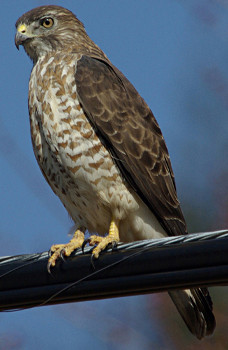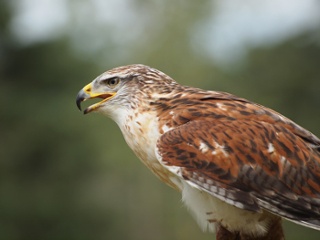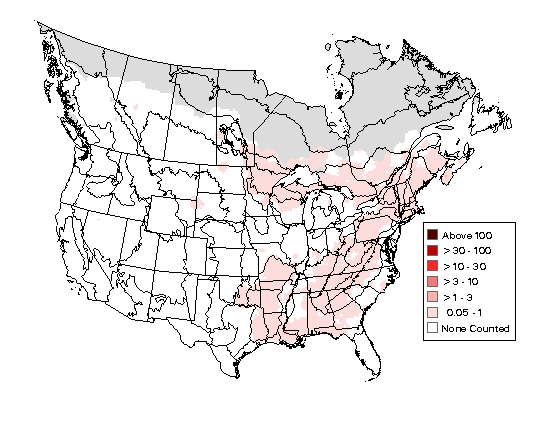Broad-winged Hawk

Broad-winged Hawk Information
Length: 14 - 19"
Breeding Habitat: Dry deciduous or mixed forests, forest edges, forest openings; wooded edges of swamps, lakes, ponds, and streams.
Diet: Small mammals such as shrews, mice, voles, squirrels; frogs, toads, lizards, snakes, large insects, some small birds.
Interesting Facts about the Broad-winged Hawk
- In the fall, Broad-winged Hawks migrate to Central and South America in large flocks (also known as "kettles"). The raptors in these flocks often number in the thousands and ride the warm upward-moving air currents called thermals.
- Each year, these raptors return to their previous nesting territory, but unlike some birds, they don't use the same nest. Instead they build a new nest or add onto an existing nest that was built by a squirrel, crow, or other hawk.
- Raccoons, porcupines, and crows sometimes prey on the eggs and/or nestlings of the Broad-winged Hawk. There have even been reports of adult Broad-winged Hawks falling prey to Great Horned Owls and eagles.
Broad-winged Hawk

© Pr2is
Broad-winged Hawk
Identification Tips
- Wingspan: 33 inches
- Sexes similar
- Short, dark, hooked beak
- Medium-sized, broad-winged, broad-tailed hawk
- Short, broad wings somewhat pointed at the tip
- Dark brown head, nape, upperwing, and back
- Pale breast with thick, reddish bars to belly
- Pale underwing with thick black margin to trailing edge
- Thick black and white bands on tail of even width
- Dark brown head, nape, upperwing, and back
- Pale breast with thick, reddish bars to belly
- Pale underwing with thick black margin to trailing edge
- Thick black and white bands on tail of even width
(Credit: U. S. Geological Survey)
Broad-winged Hawk
Breeding Bird Survey Map,
2011-2015

(Image credit: USGS)
Broad-winged HawkRange Maps from Cornell
Broad-winged Hawk breeding, migration, nonbreeding and year-round range
Includes separate map of sightings.
Broad-winged Hawk
Christmas Bird Count Map
Historical CBC Map from USGS